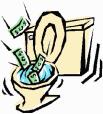The following article appeared in the Daily Herald. It was also reprinted on the Students First Website.

Property tax bills in Dist. 300 skyrocket
5/22/2006
By Jeffrey Gaunt
Daily Herald
When Linda Mitsch first saw her property tax bill this year, the Carpentersville retiree said she was floored.
"I was shocked," Mitsch said. "Totally shocked. A $1,300 increase."
Across the street, Mitsch said neighbors saw similar spikes in their tax bills - anywhere from $1,300 to $1,900 or more.
"We're on a fixed income," Mitsch said. "We have to save almost $600 a month just to pay for our real estate taxes. That's crazy."
Mitsch wasn't alone. Many area residents saw large spikes in their tax bills this year -from several hundred dollars to more than $3,000 in one year.
And like many perturbed homeowners, Mitsch looked to Community Unit District 300, where voters earlier this year approved two big tax increases.
"Just for the referendum vote alone, for the schools, it went up $700," Mitsch said. "Where is this money going?"
In fact, the District 300 tax increases are only a piece of the puzzle.
For starters, only one of the two voter-approved hikes hit tax bills this year. Homeowners are paying the 55-cent education fund tax-rate increase. But the $185 million bond issue won't hit until next year.
And while it's true the 55-cent tax increase is increasing taxes, there's more at play.
Namely, large increases in property values are driving the large increases in tax bills, independent of the voter-approved tax hikes.
The property tax cap limits the amount of money District 300 can collect from property reassessments - even when voters approve a tax increase.
But the tax cap doesn't protect against shifts in property taxes.
In other words, if your home value increases by 20 percent, and most property values in the district increase by 5 percent, you will pay a larger percentage of any tax increase.
Take Mitsch for example. The value of her home rose almost exactly 20 percent.
It's now worth roughly the same as the home of District 300 school board member John Court.
But Court's home wasn't reassessed this year. The value didn't change.
As a result, Mitsch is paying an extra $1,300 - from about $4,250 to $5,250. Court is only paying an extra $200 - from $5,180 to $5,380. And their homes are the same value.
Court didn't get off the hook because he was a school board member, though.
Superintendent Ken Arndt's tax bill jumped $1,610 - from $6,570 to $8,180. And board member Karen Roeckner's bill went up $3,390 - to a total of $12,760.
"If a particular part of the community hadn't been reassessed in some time, now they are hit big," said Cheryl Crates, District 300 chief financial officer. "It's a good news, bad news thing. The good news is their house is going up in value. The bad news is so are their taxes."
Rather than blaming District 300, property owners should be looking to the county, Dundee Township Assessor Daniel McMahon said.
"We did our job according to state statute," McMahon said of the assessor's office. "Knowing there were some places that we're going to go up 20, 30, 40 percent in value.
"The Kane County Board, they had an opportunity last March to enter into a 7 percent tax cap," McMahon said. "They chose not to do that."
Karen McConnaughay, who heads the county board, said she doesn't remember all of the details of that vote.
But she does remember the county analyzed the numbers, and decided the 7 percent cap wasn't in the best interest of property owners.
"We saw it as a flawed piece of legislation that did not, in fact, accomplish what it was supposed to," McConnaughay said. "We did our own research on the implications of the proposed freeze and came up with the same analysis a lot of other counties came up with.
"It was not a permanent freeze, it was a temporary freeze," she said. "That increase in assessed valuation would be realized, just at a later date."
Even though the board opted not to impose the cap on reassessments, county board member John Noverini said he understands the concerns.
"People are getting fed up," Noverini said. "It's scary. People are being taxed out of their homes."
Noverini said he would support legislation that eliminates all property reassessments until a house is sold.
"That's the way it should be," Noverini said, arguing that houses are the only capital investment where people pay more each year as the value of the asset increases.
"People are upset," Noverini said. "I don't blame them for being upset."
No comments:
Post a Comment